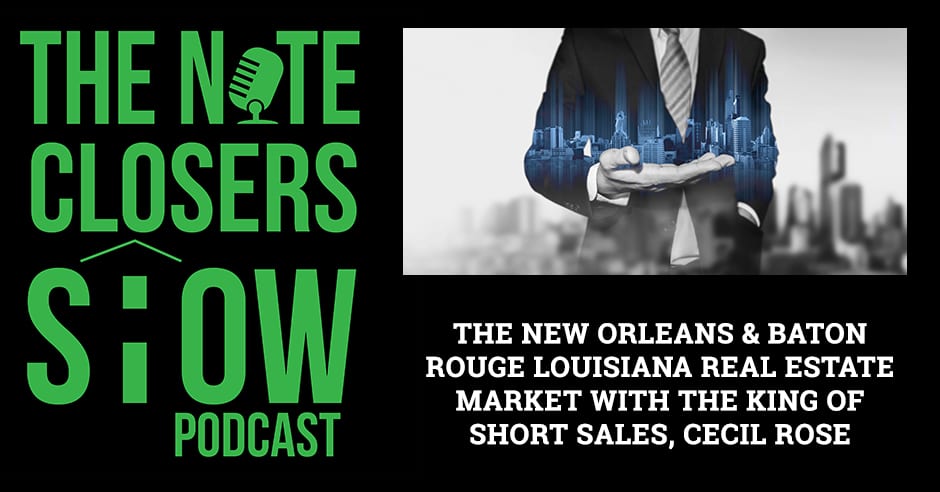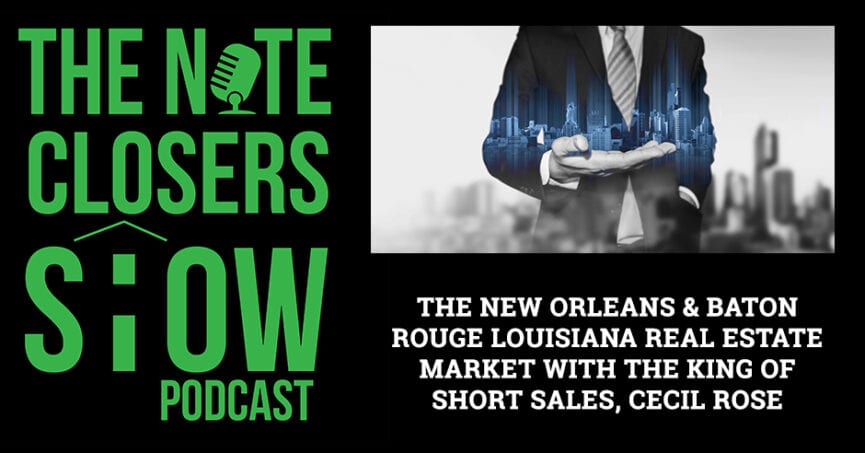
Louisiana is one of the states that are most badly affected by the COVID-19 pandemic, and the real estate market has really felt the brunt of the crisis. With the current rate of foreclosures – among the highest in the nation – short sale deals are starting to increase, but many investors are backing out because of market uncertainty and high rates of delinquency and forbearances. Scott Carson gets into the details of these significant developments with Cecil Rose, a real estate agent and investor who has specialized in short sales and other creative financing strategies for the last nine years. Focusing on the New Orleans and Baton Rouge markets, Scott and Cecil discuss the current state of the Louisiana market, what investors are looking for and what the future holds. It will be a rough ride for the Bayou State, but there might still be opportunities if you know where to look for them.
—
Watch the episode here
Listen to the podcast here
The New Orleans & Baton Rouge Louisiana Real Estate Market With The King Of Short Sales, Cecil Rose
I’m excited to have a buddy who’s doing some amazing things in Louisiana, particularly in the biggest area thereof Baton Rouge, home to the LSU Tigers. We’ve got our buddy, Cecil Rose. He’s also a fellow podcaster, the host of the Dive into Real Estate Investing for Newbies podcast. I was honored to be a guest on his show. We’re excited to have you. Cecil, share a little bit with our audience about where you got started and what you’re focused on these days with the market?
I appreciate you letting me be on your show. You were on my podcast and we had a blast. What you’re doing is effective. You’re helping a lot of people, especially with notes. I got started off trying to learn notes. This was about several years ago. I failed miserably in it how you try to find some type of niche. I had graduated from college, but I started learning about real estate in college. Like everybody you read Rich Dad Poor Dad. You read Dale Carnegie and all of these books. You try to figure out, try to navigate your way through. I stumbled on pre-foreclosures and short sales. I didn’t know how to do that.
I didn’t know whether I should get my real estate license. I met some people in real estate, but I never had a coach. To be honest with you, I was failing miserably trying to reach and contact people. I signed up for an event in Atlanta, Georgia. I paid some money for. I drove. I stayed with some relatives out there. I got a little education. I got back to Baton Rouge. I started doing short sales from there. From there, I got my real estate license. With me doing short sales, having my license will probably be beneficial. That’s how I got started. I’m still doing short sales. I am in the red boot as we call it, The Big Easy. I’ve been to New Orleans. I grew up in New Orleans. Now I’m in Baton Rouge, the home of The National Champions, LSU. We got some good eating out here too.
I was out and spoke at an event earlier on in New Orleans. I had a bullet gumbo with every meal, breakfast, lunch, and dinner because I love it. Let’s talk about the market. You got started in short sales as I did. You got to have a passion for it because that’s bidding now on a daily basis for the most part. Are you still seeing a lot of those in Baton Rouge and New Orleans or around the Bayou State?
I try to keep up statistically and read through Black Knight. The forbearance, they say is $4.3 million in delinquencies. Louisiana is in second and Mississippi may be in first and then you got New York and New Jersey. I’ve never stopped marketing since COVID-19 because even though with the moratorium, they extended it. There are people who are still were 5, 6 months behind before even COVID-19. I said, “I’m not going to stop.” Most investors are probably stopping. That’s all they did was pre-foreclosure, which I don’t do a short sale. I’m still marketing. I picked up a few deals. Somebody called me out of the blue and said, “I don’t know what to do.” I was able to get on the phone. We will talk later more about what I want to do with those deals or what I’m trying to do with them.
It’s still a lot out there. Louisiana was hit hard with everything going on with COVID. I was looking at banking ratios. One of the things I like to track is I pull a list from Bauer Financial and it ranks banks on a 0 to 5-star basis, 5 being great and 0 being out of business. When you pulled the list of Louisiana banks, there’s a one-star bank right off the bat. It’s the Bank of Louisiana. It’s struggling. You dealt with a few short sales from the Bank of Louisiana.
They got portfolios. That’s a good place to have a good relationship with those bankers because they may have some portfolios of defaulted nonperforming notes. They struggling. A lot of people are surprised, especially big businesses and restaurants are struggling.
Stuff is still moving though. You still got people that are buying and selling houses. With Baton Rouge and New Orleans, you’ve got your finger in both pies, for the most part. Which market is better positioned to get through all the craziness? Would you say Baton Rouge is a little bit stronger market or New Orleans is a stronger market?
Baton Rouge is a little stronger. They said up to 2.4% as far as in ourselves. We don’t have enough inventory. I finished rehab. It took me about three months. The first day I put it on a market, I had multiple contracts. People are looking. Single-family’s, our medium price out here is around $212,000, but the house I sold was around $150,000. If you’re in that price range, it’ll sell all day, single-family, three-bedroom, two full baths. It’s been consistent. That’s why I got more investors that are calling me looking for deals. By me not being a realtor, but also an investor, I know they’re looking for off the market deals because everything that’s on the MLS is overpriced. Everybody wants to retail for them.
I’m glad you brought that up because people have seen a lot of price reductions too on the MLS over the last 90 days. Let’s dive into that a little bit though. Price reductions is one thing. With you still doing short sales and stuff like that, what was the average timeframe for you to get a short sale done pre-COVID, 6 months, 9 months, 60 days? I know it’s gotten streamlined a lot more than it was several years ago.
I did one and I was surprised because most of my short sales I can get done less than three months. I had one that it took me about six months it was because buyers kept backing out. They didn’t have the funding they wanted, things to be repaired, but that was the only reason why that one took so long. For my short sales have been taking at least about 60 days if I can hurry up and push through and get the approval letter. The short sales that I have on the market, as far as retail, it’s been a little difficult. I got a house in New Orleans. I’m telling real estate agent, I’m telling investors, “Please go look at this house because I’m getting multiple offers signed on scene. I’m letting you all know up-front in the MLS, how much repairs this thing needs and foundation to electrical to plumbing.”

Louisiana Real Estate: Baton Rouge is a little stronger market than New Orleans right now, but Louisiana as a whole has been hit hard by the COVID-19 pandemic.
They said, “I don’t care. I want to send this offer.” When they go and look at it, “No, we’re going to rescind.” It’s there, but to me, it’s putting more time and effort because they want me to submit the offers to the lender, but in between an inspection period, they pull it out. I’m like, “You got the lender process in this short sale to get an approval, but you hadn’t done your due diligence.” It’s a waste of time for me. That’s what I’ve been noticing lately on a lot of my retail short sales that I have on the market.
Let’s talk a little about some of the price points of short sales. The days of getting the stuff at $0.30, $0.40, $0.50 of value, it’s been over for a while. Where are you seeing the negotiations? Are you seeing 10%, 15%, 20%? You had a good deal too. You mentioned before you picked up like $0.50 and $0.33 on the dollar, but it needs a lot of work.
That one didn’t need as much work, but I’ve been picking up a lot of pretty houses. Once you get those from VA to FHA appraisals, even if you go in 65% to 70%, it’s coming in at least 80%. You can’t do anything about it. It’s a listing. It’s not a deal where an investor would want to do. To get into that, you were talking about with the notes and doing subject tools. Those are good deals depending on how far those homeowners are behind it most homeowners $10,000, $15,000 behind, which is not that bad. If the homes are already vacant, if you’re willing to do a subject to and all that on it those are good rental deals without taking over them, in your name for the mortgage.
You can put the properties in a trust and then keep it as a subject to deal provided the PITI and expenses are less than market rent. That’s where our next question is, the banks are willing to keep those loans performing in some fashion, whether it’s forbearance agreements or deferments. They’re don’t care. You asked people to talk about the sale clause and if you do it, you’re technically buying the asset with existing financing. As long as the banks getting paid, they don’t care. They don’t have time, especially right now, they take on any type of payment to make things.
That’s where we’re going to see a lot of opportunities here is that forbearance, loan modifications and you’re out of the house, but at least work with me to get a loan mod done to make it more desirable. We can get something is taken care of that payment for 2, 3, and 4 years until they get refinanced out and then go from there for the most part they can. That $0.80, you’ve got to come in cash. That’s a tough play as an investor, but if you can pick up the notes at a discount, that’s a phenomenal thing. You and I need to talk a little more about the different banks you’re seeing on your short sales. Let me work my magic on this end. You find a retail buyer, let me split the profit somewhere in the middle.
When we were talking about Airbnb, that particular market in New Orleans is a profitable market because we got the Mardi Gras. We got the French Quarter, Bourbon Street. They are stricter now if you hadn’t been grandfathered in. They’re making the owners or sellers of those properties got to be occupied. They have to occupy either some side or one side or however it is, a mix-use or whatever. That has eliminated a lot of people doing short-term rentals. In East Baton Rouge, we don’t have that because it’s more like football season out here. We do have some Mardi Gras in Baton Rouge, but other than that, it’s not as strict in New Orleans. A lot of people who are trying to do Airbnb, you can’t do it like they were doing a few years ago.
That’s a big concern for a lot of the big college towns. That’s what I was going to ask you in Baton Rouge. If it’s the season is canceled, that’s going to hurt a lot of people, especially with short-term rentals are writing out for Friday through Sundays. Every weekend they could and also lean into basketball season, stuff like that. We’ve had some of that up in South Indiana and places like that too, where you have big programs. The city will increase by $100,000 to $200,000 in a weekend. Now, it may not be. Let’s face it, Coach O is not happy. His team was getting sick.
They were showing how they were going to have the steam or whatever or the disinfection running. I don’t how they are going to do that. Don’t get me wrong. Tiger Stadium is big. You can separate people, but with the number spiking, people are still cautious on how this thing going to play out.
Speaking of rents, let’s bring it back into there. New Orleans and Baton Rouge have different demographics, different makeup because of vacation stuff. If you’re an investor and you’re looking at a property, let’s say a normal single-family home, is there a rent rate number that when you see it on a property as a market rent rate, you cringe like, “That’s got to be a rough area?” What’s that number in either city?
The average rent rate I would like to go for is about $1,200 a month. In East Baton Rouge, there are places where $500 or $600. Particularly, South Baton Rouge and some of the areas, I wouldn’t probably mess with those areas. You know what type of rents it’s going to be hard. I had a wholesale deal where an older gentleman, he had eleven properties and $500 and $600 was his max rent, but all of them were rent flowing. Some of my investors wouldn’t touch that area. For another investor, that’s an area that he loves. For different investors, that’s what they want. I got to get something a little higher than that. When it comes to rent, you would get more money in New Orleans than what you get in East Baton Rouge.
It’s the same thing in New Orleans. Is it the same price point you see, $500, $600? Is it a rougher area for the most part?

Louisiana Real Estate: Multifamily is big in New Orleans. That is what most investors are looking for, but it’s rare.
Yeah. You get that with the regentrification and everything that’s going on out there, closer to New Orleans, closer to Canal Street, you could get $1,000 easy in that area. Shotgun home is not even like the homes in Eastbound Rouge.
That’s one of the big things when we’re seeing things online. Investors are getting these listings. Run the rent rates like in Columbus, Ohio, great city. They’re like a college town, but if it’s in $500 rent, that’s a two-gun alley. You better go in the pack some meat in a bulletproof vest in some cases. Every city has got that. We didn’t have that here in Austin, Texas. They’re not opportunities. I know a guy who had 60 rentals in Gary, Indiana, which was a rough area. Gary is one of the roughest in the country. He made it work until the markets crashed. The banks called the loans due and went from there. Coming back to New Orleans and Baton Rouge and stuff like that, it’s a little bit of a longer foreclosure process. It’s not your traditional judicial, nonjudicial foreclosure. What timeframe does it take to foreclose in the two cities?
You’re looking from either 60 to 180 days in Louisiana. It’s not like Texas. It would be good because many people have been dragging their feet. I’ve been speaking to people who were 6, 7 months behind before COVID. They’re milking the forbearances. When my bank reached out to me and I’m like, “You’re still not working, don’t have a job, and upside down.” I’m not trying to tell you what to do, but I’m saying, “Look at the numbers. Are you going to be able to catch up?” People drag it out to the last minute. It’s a normal thing. They’ll call you a month ahead and say, “I’ve tried all this. Can you help me get this done?”
Our heart goes out to all the entertainers, the business owners, the service industry people that have been affected, that’s a different story. You’ve mentioned they take, not just 1 mile, but 2 miles, two handfuls, and drag it out to six months foreclosure. You’ve got some historical properties. You’d be careful about with what you do, but anything else unique in New Orleans, Baton Rouge that investors need to keep an eye out for when they’re looking at real estate or even notes?
Multifamily is big in New Orleans. I got a lot of investors that’s what they look for. It’s not as big in East Baton Rouge because you start getting more into the rural areas when you move out of New Orleans. Mobile home parks are a big thing in East Baton Rouge. We got Livingston Parish that’s close. We got Lafayette going. People love mobile home parks for some reason, especially in the traditional way everything is already in. You don’t have to build anything or put anything in. Everything is coded already. A lot of investors are looking for that. Multifamilies in New Orleans, that’s what most investors are looking for. That’s rare. To me, that’s been difficult to find. Even close to LSU, a lot of investors like to buy in that area, 100 plus units. They’re hard to find. Everybody wants them.
Everybody wants 100 units and more, and I’m like, “That’s great. It doesn’t mean that banks are going to sell. The bank still knows that.” If you keep track people that bought a property in the last twelve months, that may be over-encumbered the property or pay too much. We all know apartments are the most expensive asset out there. We will flashback to what we saw several years ago, we saw a lot of apartments that were bought at the peak of the market. The borrowers raise capital thinking they could regentrify the asset, increase rent rates immediately. Go get a bank loan and cash out their investors in 36 months. We know that’s not going to happen. The banks aren’t going to be refinancing out. You’re going to have a capital call when the values drop. They’re going to bring another 20%, 25% of cash to the table. Investors aren’t going to pony that up with everything. There’s going to be some opportunity for that. You got to keep your ear and nose to the grindstone. I’d be reaching the Bank of Louisiana and see if they got any non-performing.
Have you noticed that with a lot of multifamily units, commercial, you being in the note business, the number of defaulted notes are high?
The banks are still waiting to see where everything’s at, what the government’s going do on the residential side. The commercial notes stuff, when you have states and cities putting moratoriums on foreclosures and things like that, stopping on the residential commercial side, they’re still waiting to see. I will tell you these hard money lenders have been ringing my phone off the hook, looking to see if I’d buy their debt because they’re at $0.70, $0.75of value supposedly. I’m not going to pay par for a project that’s not needed. If I can’t foreclose on it for six months, then it doesn’t make any sense for me to buy anything that would make sense.
The opportunity is buying some of the stuff and if you can get the borrowers or modify the loan in some fashion, that makes a good yield play for you, write it out for the next 6, 12 months and they still can’t come to the table. Go to the foreclosure route to take the property back if they need to or at that point, maybe they get back to work and go from there. That’s the biggest play on that residential side. Commercial side, you’re going to have to be careful on what you’re buying. That’s what’s multifamily, but your strip malls or restaurants, your retail space, that’s all taken out. We’re expecting to see a 20% decline in retail space across the country in a few years. If you can buy something that’s going to put a tenant in place or something that you’ve known, that’s where my local investors are going to have the biggest assets because they’re going to know people and they can pivot as they need to.
We all know that malls are in trouble and big-box stores are in trouble. If you keep an eye out for that, you’re going to see conversions like some of the bigger box stores that are stand-alone may be converted into self-storage facilities older Walmarts or grocery stores, or I love what you said. If it’s a weird piece of land, convert it to a mobile home, or even regentrifying your commercial space into a residential space if you can do that. I’ve got a buddy who’s converting a 60-unit hotel into a 40-unit apartment complex. It’s a brilliant play. You’re going to see a lot of that everywhere. Keep an eye at any hotels that are in default that can be converted relatively easy. Cecil, you’re doing such an amazing job out there. You’re kicking butt and taking names. What’s the best bit of advice you can tell investors who are reading this about when they’re reaching out to an investor-friendly realtor, what’s the things that you like, and what’s a couple of things that are the biggest pet peeve with people?
There’s a lot of coaches out there. When I got into real estate, I believe in investing in my education. You need to invest in the right education and you also got to be coachable too. Get a mentor, don’t be cheap. Don’t waste a lot of time. There’s a lot of information on social media. That’s good. You’re going to run into something when you can’t figure it out. Scott is a good mentor when it comes to closing notes. If you don’t know something, get a mentor. That would be my advice to someone, investing in education and be willing to learn, get good at that and not learn many other things, focus on one thing and then try to complete the next thing.

Louisiana Real Estate: Invest in your education. Get a mentor and be coachable as well.
How many people have you seen since you started and you focused on the short sale side of the business, try to do a multitude of other things, and never find success? There’s a lot.
There are many people who do that. It is funny because I have a private investor or a private lender. He loans money, but he never did a deal before. That’s all he does with them. We talk about doing deals all the time and I’ve done deals. I say, “Do a rehab or flip.” He said, “I’m fearful.” He got all these programs. He watched all these seminars books. I’m like, “What are you good at?” “Probably lending.” “You got that down. Why not take the money you have and do it there?” He still has not done a deal yet.
At least he’s pulling the trigger and letting money out. Cecil, first of all, would you come back on for our Note Nation when we focus on New Orleans? Would you come on and be our agent talking about New Orleans. We’ll have you on about that. What’s the best way for people at Note Nation, to work with you, to reach out, see if you got any deals, or help them out as they find notes or assets in those markets that you can help them with?
You can find me on Instagram @KingOfShortSales, Facebook, King Of Short Sales, LinkedIn King Of Short Sales. My podcast, Dive into Real Estate for Newbies. You can contact me through there. Those are my handles.
Are you doing short sales in Louisiana or in other states as well?
I’m doing them in other states as well. I have some people trained up that can do the negotiation. That’s the biggest thing people want to negotiate. They don’t want to do the paperwork. They want to, “Give me the deal once it’s ready, then we can figure out if it’s a goodbye or not.”
We are honored to have the King of Short Sales, Cecil joins us. Cecil, once again, thanks for being on the show. Thanks for doing what you’re doing. We’ll be in touch soon and some other stuff.
Thanks, Scott. I appreciate you being on.
—
You’ve learned a lot from Cecil talking about the two different markets what to look for. Many markets we’re going to a hurry up and wait for an aspect of it. God knows that’s the short sale business. Hurry up make the phone call, wait for the bank to make a damn decision, and go from there. If you’re buying something in Baton Rouge or New Orleans, or you need some advice or counsel reach out to him, take care of the guy who does a great job, got a big heart for working with investors, and take that and pull the trigger. We’ll see you all at the top.
Important Links:
- Dive into Real Estate Investing for Newbies
- Rich Dad Poor Dad
- Black Knight
- @KingOfShortSales – Instagram
- King Of Short Sales – Facebook
- King Of Short Sales – LinkedIn
About Cecil Rose
 Cecil Rose is a Real estate agent, investor, that specializes in short sales and other creative financing strategies. He’s been in real estate for 9 years.
Cecil Rose is a Real estate agent, investor, that specializes in short sales and other creative financing strategies. He’s been in real estate for 9 years.
Love the show? Subscribe, rate, review, and share!

